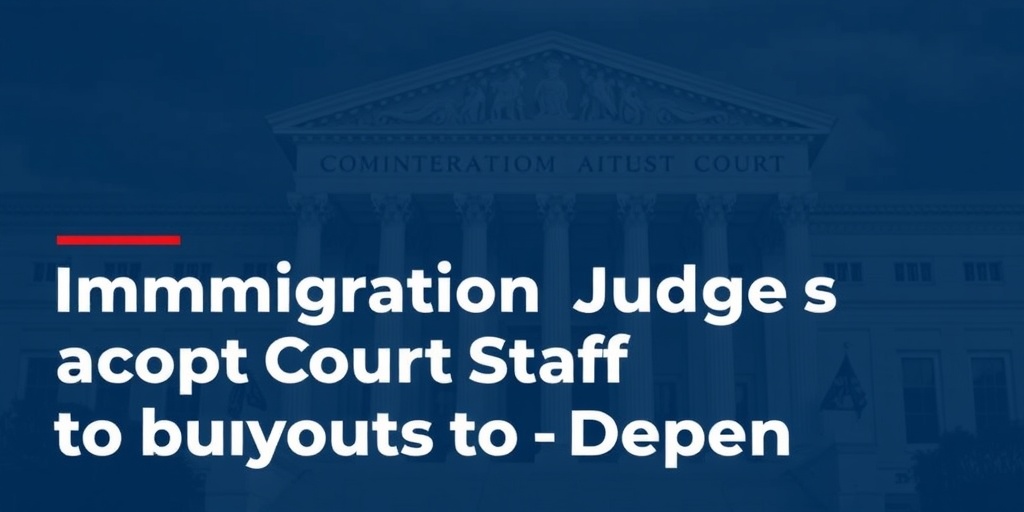Now Reading: Immigration Judges and Court Staff Accept Buyouts to Depart
-
01
Immigration Judges and Court Staff Accept Buyouts to Depart
Immigration Judges and Court Staff Accept Buyouts to Depart

Title: Immigration Judges Depart Amidst System Strain and Deportation Challenges
In a significant blow to an already overwhelmed immigration court system, reports have emerged that numerous immigration judges have opted to accept government offers for early retirement or deferred resignations. This decision, confirmed by a union official on Thursday, further exacerbates challenges in a system that the Trump administration had vowed to strengthen.
According to the union representative, a total of 85 employees, which includes 18 judges, have chosen to leave the Justice Department’s Executive Office for Immigration Review (EOIR) through these government buyouts. This development follows the earlier termination of 29 other officials, including top leadership within the department. Since President Trump assumed office, nearly 40 out of over 700 immigration judges present have been either fired or have agreed to exit the system.
Immigration judges, unlike their counterparts in the judicial branch, operate within the administrative court system under the Justice Department. Their roles are critical as they determine the fate of asylum seekers and individuals facing deportation from the United States. During his campaign, President Trump had pledged to hire more judges to tackle the considerable backlog of immigration cases, which has left many individuals languishing for years in uncertainty regarding their status.
The departure of these judges raises concerns about the administration’s ability to effectively carry out its immigration policies, particularly its goal of deporting millions of undocumented immigrants. The delays inherent in the adjudication process contribute to the rising number of undocumented individuals residing in the U.S. as they await a resolution of their cases. Critics argue that the exodus of judges undermines the very objectives the Trump administration aims to achieve.
Matthew Biggs, president of the International Federation of Professional & Technical Engineers, pointed out the irony in the situation, stating, "Donald Trump ran for office promising to boost deportations, but as president, his administration’s policies are actually decreasing the number of immigration judges and judge teams who hold deportation hearings." This statement encapsulates a growing sentiment that the administration’s actions are counterproductive to its stated goals.
Currently, each immigration judge is responsible for managing an average of 500 to 700 cases annually, amid a staggering backlog of over 3.7 million cases. These figures, derived from data compiled by the Transactional Records Access Clearinghouse at Syracuse University, reflect a long-standing issue within the immigration system—one that has been under pressure for decades. As cases can take years to resolve, many immigrants begin to settle into their communities, often starting families while their statuses remain unresolved.
Biggs elaborated on the challenges of replacing immigration judges, emphasizing the specific skill set and experience required for the role. He noted that the process of recruiting, hiring, training, and conducting background checks for new judges typically takes at least a year, further complicating an already strained system.
Despite bipartisan support for increasing the number of immigration judges to address these issues, the current administration has opted to dismiss judges from the Board of Immigration Appeals as well, suggesting a concerning trend of further reductions in judicial capacity.
"This makes no sense," Mr. Biggs stated, expressing frustration over the apparent disconnect between immigration policy goals and the reality facing the immigration court system. The Justice Department has recently indicated its intention to implement cuts, as evidenced by a memo issued last month stating that immigration judges could be dismissed at will. The implications of such policies raise alarms about the future of immigration adjudication in the United States.
As the immigration court system continues to grapple with a severe backlog and dwindling judicial resources, the impact on families and individuals seeking asylum or facing deportation becomes increasingly profound. The trajectory of the immigration system under the Trump administration remains uncertain, with the future of the court system at a pivotal juncture. As the system struggles to cope with its challenges, the very people at the heart of immigration policies—judges, asylum seekers, and undocumented immigrants—find themselves in a precarious situation with far-reaching consequences.
Stay Informed With the Latest & Most Important News
Previous Post
Next Post
-
 01New technology breakthrough has everyone talking right now
01New technology breakthrough has everyone talking right now -
 02Unbelievable life hack everyone needs to try today
02Unbelievable life hack everyone needs to try today -
 03Fascinating discovery found buried deep beneath the ocean
03Fascinating discovery found buried deep beneath the ocean -
 04Man invents genius device that solves everyday problems
04Man invents genius device that solves everyday problems -
 05Shocking discovery that changes what we know forever
05Shocking discovery that changes what we know forever -
 06Internet goes wild over celebrity’s unexpected fashion choice
06Internet goes wild over celebrity’s unexpected fashion choice -
 07Rare animal sighting stuns scientists and wildlife lovers
07Rare animal sighting stuns scientists and wildlife lovers





















